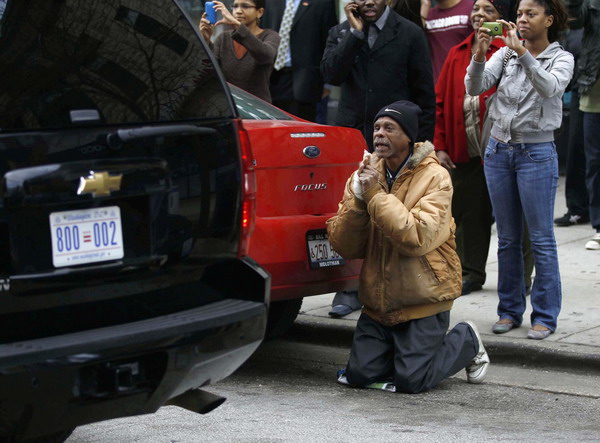Asia-Pacific
US Republicans say voters will repudiate Obama
(Agencies)
Updated: 2010-11-01 15:53
 |
Large Medium Small |
WASHINGTON - With two days left in a bitter fight for control of the US Congress, Republicans on Sunday appeared headed to a smashing victory they said would be a repudiation of President Barack Obama and his policies.
|
 A man gets on his knees next to the car carrying US President Barack Obama as he pulls away from Valois restaurant in Chicago, October 31, 2010. [Photo/Agencies]? |
Candidates across the country launched a frantic final push for support, and Obama ended a two-day campaign swing designed to pump up Democratic turnout less than 48 hours before Americans begin to cast their ballots.
"If everyone who fought for change in 2008 shows up to vote in 2010, we will win this election," he said.
Spurred by voter discontent with the ailing economy and with Obama, Republicans are expected to recapture control of the House of Representatives and make big Senate gains on Tuesday.
Democrats hope to hang on to a narrow majority in the Senate by pulling out victories in a few tight Senate races in states like California, Washington and West Virginia.
Republican leaders said the results will be a rejection of Obama's economic leadership, which includes costly government programs like the economic stimulus and broad initiatives like the healthcare overhaul.
"If Republicans win, that's what it will be - a repudiation of Obama's policies," Mississippi Governor Haley Barbour, head of the Republican Governors Association, said on NBC's "Meet the Press."
Sarah Palin, the Republican vice presidential candidate in 2008, said Tuesday's voting would be "a political earthquake" that would send a message to Obama.
"They're going to say, 'You blew it, President Obama. We gave you the two years to fulfill your promise of making sure that our economy starts roaring back to life again,'" she said of voters while appearing on "Fox News Sunday."
Gridlock on the agenda
Republican control of at least the House could result in efforts to repeal parts of the healthcare bill and a renewed bout of gridlock on pending issues like expiring tax cuts, climate change and immigration.
Neither side was predicting a new era of compromise.
"If they want to stick with this filibuster strategy, obstruction and saying no, it's going to be difficult to do anything," Dick Durbin, the No 2 Senate Democrat, said of Republicans on CNN's "State of the Union."
All 435 House seats, 37 of 100 Senate seats and 37 of 50 state governors' offices are up for grabs in Tuesday's voting. Republicans must pick up 39 Democratic seats to take power in the House and 10 to take the Senate.
With competitive battles raging for more than 90 Democratic House seats, independent analysts predict huge Republican gains of more than 50 seats in the House.
A Pew Research Center poll showed Republicans have a solid lead in congressional preferences, with 48 percent of likely voters saying they would back a Republican in their district to 42 percent who favor a Democrat. Two weeks ago, Republicans led by 50 percent to 40 percent.
In the Senate, Republicans probably need to string together wins in six of seven close races in California, Washington, Nevada, Colorado, Pennsylvania, Illinois and West Virginia to claim a majority.
Polls show Governor Joe Manchin in West Virginia, Senator Barbara Boxer in California and Senator Patty Murray in Washington, all Democrats, with slight leads in their Senate races.
Senate Democratic leader Harry Reid trails slightly in final polls in his desperate re-election struggle with Republican Tea Party-favorite Sharron Angle in the most high-profile Senate race.
Democrats tried to paint a positive picture of what could be the party's worst election showing since 1994, when Republicans grabbed control of both houses of Congress.
"This is not 1994," Senator Robert Menendez of New Jersey, chairman of the Senate Democratic campaign committee, said on ABC's "This Week."
"We understand that people are hurting in this country, but our goal is to have them understand and channel their anger on election day against the Republican Party that brought us to the verge of economic collapse in November of 2008," he said.




